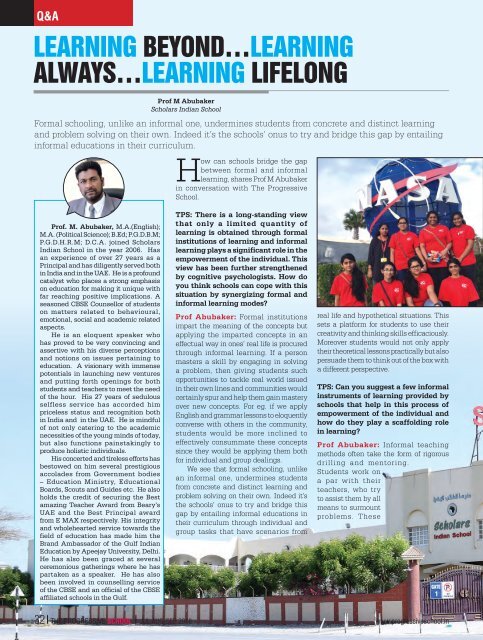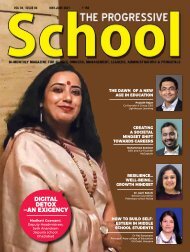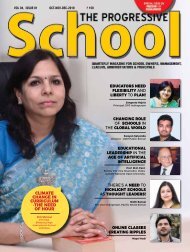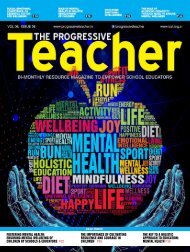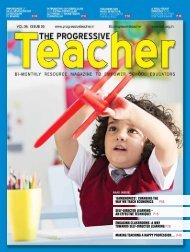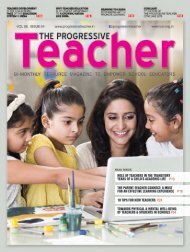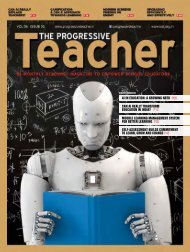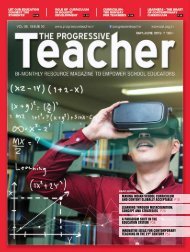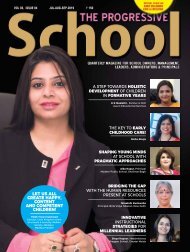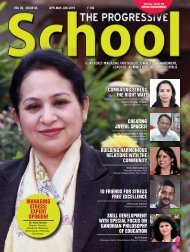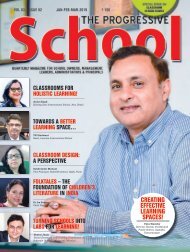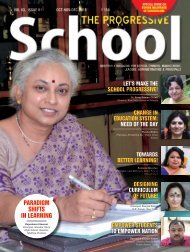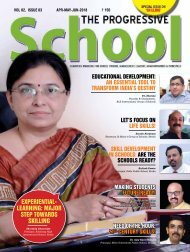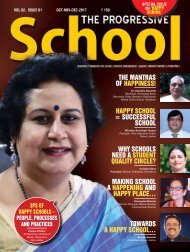The Progressive School Vol 02 Issue 04
The Progressive School is a quarterly magazine for school owners, leaders and principals. It will continue to address vital issues that impact the emerging challenges in the design, administration and growth of schools in all its dimension.
The Progressive School is a quarterly magazine for school owners, leaders and principals. It will continue to address vital issues that impact the emerging challenges in the design, administration and growth of schools in all its dimension.
Create successful ePaper yourself
Turn your PDF publications into a flip-book with our unique Google optimized e-Paper software.
Q&A<br />
LEARNING BEYOND…LEARNING<br />
ALWAYS…LEARNING LIFELONG<br />
Prof M Abubaker<br />
Scholars Indian <strong>School</strong><br />
Formal schooling, unlike an informal one, undermines students from concrete and distinct learning<br />
and problem solving on their own. Indeed it’s the schools’ onus to try and bridge this gap by entailing<br />
informal educations in their curriculum.<br />
How can schools bridge the gap<br />
between formal and informal<br />
learning, shares Prof M Abubaker<br />
in conversation with <strong>The</strong> <strong>Progressive</strong><br />
<strong>School</strong>.<br />
Prof. M. Abubaker, M.A.(English);<br />
M.A. (Political Science); B.Ed; P.G.D.B.M;<br />
P.G.D.H.R.M; D.C.A. joined Scholars<br />
Indian <strong>School</strong> in the year 2006. Has<br />
an experience of over 27 years as a<br />
Principal and has diligently served both<br />
in India and in the UAE. He is a profound<br />
catalyst who places a strong emphasis<br />
on education for making it unique with<br />
far reaching positive implications. A<br />
seasoned CBSE Counsellor of students<br />
on matters related to behavioural,<br />
emotional, social and academic related<br />
aspects.<br />
He is an eloquent speaker who<br />
has proved to be very convincing and<br />
assertive with his diverse perceptions<br />
and notions on issues pertaining to<br />
education. A visionary with immense<br />
potentials in launching new ventures<br />
and putting forth openings for both<br />
students and teachers to meet the need<br />
of the hour. His 27 years of sedulous<br />
selfless service has accorded him<br />
priceless status and recognition both<br />
in India and in the UAE. He is mindful<br />
of not only catering to the academic<br />
necessities of the young minds of today,<br />
but also functions painstakingly to<br />
produce holistic individuals.<br />
His concerted and tireless efforts has<br />
bestowed on him several prestigious<br />
accolades from Government bodies<br />
– Education Ministry, Educational<br />
Boards, Scouts and Guides etc. He also<br />
holds the credit of securing the Best<br />
amazing Teacher Award from Beary’s<br />
UAE and the Best Principal award<br />
from E MAX respectively. His integrity<br />
and wholehearted service towards the<br />
field of education has made him the<br />
Brand Ambassador of the Gulf Indian<br />
Education by Apeejay University, Delhi.<br />
He has also been graced at several<br />
ceremonious gatherings where he has<br />
partaken as a speaker. He has also<br />
been involved in counselling service<br />
of the CBSE and an official of the CBSE<br />
affiliated schools in the Gulf.<br />
TPS: <strong>The</strong>re is a long-standing view<br />
that only a limited quantity of<br />
learning is obtained through formal<br />
institutions of learning and informal<br />
learning plays a significant role in the<br />
empowerment of the individual. This<br />
view has been further strengthened<br />
by cognitive psychologists. How do<br />
you think schools can cope with this<br />
situation by synergizing formal and<br />
informal learning modes?<br />
Prof Abubaker: Formal institutions<br />
impart the meaning of the concepts but<br />
applying the imparted concepts in an<br />
effectual way in ones’ real life is procured<br />
through informal learning. If a person<br />
masters a skill by engaging in solving<br />
a problem, then giving students such<br />
opportunities to tackle real world issued<br />
in their own lines and communities would<br />
certainly spur and help them gain mastery<br />
over new concepts. For eg. if we apply<br />
English and grammar lessons to eloquently<br />
converse with others in the community,<br />
students would be more inclined to<br />
effectively consummate these concepts<br />
since they would be applying them both<br />
for individual and group dealings.<br />
We see that formal schooling, unlike<br />
an informal one, undermines students<br />
from concrete and distinct learning and<br />
problem solving on their own. Indeed it’s<br />
the schools’ onus to try and bridge this<br />
gap by entailing informal educations in<br />
their curriculum through individual and<br />
group tasks that have scenarios from<br />
real life and hypothetical situations. This<br />
sets a platform for students to use their<br />
creativity and thinking skills efficaciously.<br />
Moreover students would not only apply<br />
their theoretical lessons practically but also<br />
persuade them to think out of the box with<br />
a different perspective.<br />
TPS: Can you suggest a few informal<br />
instruments of learning provided by<br />
schools that help in this process of<br />
empowerment of the individual and<br />
how do they play a scaffolding role<br />
in learning?<br />
Prof Abubaker: Informal teaching<br />
methods often take the form of rigorous<br />
drilling and mentoring.<br />
Students work on<br />
a par with their<br />
teachers, who try<br />
to assist them by all<br />
means to surmount<br />
problems. <strong>The</strong>se<br />
32 THE PROGRESSIVE SCHOOL JUL-AUG-SEP 2018<br />
www.progressiveschool.in


